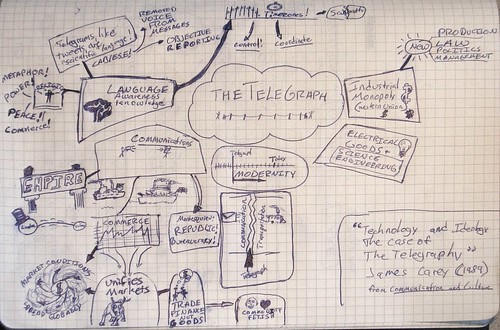Did Modernity start with the telegraph? In our class last Wednesday, we discussed this claim from James Carey’s 1989 book, Communication as Culture: Essays on Media and Society (you can read Carey’s telegraph article here). Here is his astonishing and fascinating central claim:
the innovation of the telegraph can stand metaphorically for all the innovations that ushered in the modern phase of history and determined, even to this day, the major lines of development of American communications.
(Carey, page 2, emphasis mine)
The cultural and political history of 19th century technology have been an interest of mine for some time, so I wanted to revisit Carey’s arguments. On closer reading, I have significant objections to his almost hagiographic stance towards the telegraph. Carey gives it credit for fundamental changes in everything from the possibility of nationalism to the modern desire for electronic commodities, the global economy, and the power of timekeeping in modern life.
Carey takes an important insight too far: that the study of technology is the study of complex systems, not just complicated ones. My friend David Delamore, an educator at the Engineering Design Center at the University of Cambridge, tells me that the study of a complicated system just involves understanding its mechanisms. A complex systems approach on the other hand includes the broader ecosystem of a technology: law, culture, user experience, and so forth. Carey rightly sees beyond the telegraph as a mechanism, recognising its larger position within modernity. He ascribes the telegraph broad influence in many spheres– legal, managerial, financial, cultural, religious, political and even psychological. Yet in drawing our attention to these broader issues, Carey reaches too far, claiming causal importance for the telegraph in many of these areas.
Consider the following examples. Carey claims that the telegraph created new forms of relations between businesses, ones based on procedures rather than personality. He also claims that the telegraph created a need for standard measures among raw materials. Yet both of these trends can be traced to a time before the telegraph. My knowledge of 19th century manufacturing is limited to casual reading and museum visits (c.f. Hagley, Harpers Ferry, and the Mercer Museum). Yet even I can trace the American drive for standardisation in manufacturing predates to at least half a century before the telegraph. Nor do I believe that the notion of well-functioning, impersonal bureaucracy created by the telegraph. The value of impersonal address was already a well-established principle within parliaments. Just to pick an example, Jefferson’s Manual of Parliamentary Practice, which he compiled in 1801, states “No person in speaking, is to mention a member then present by his name; but to describe him by his seat in the House.”
What I do accept is that the telegraph played a powerful role in the larger techno-social ecosystem in combination with other factors. Telegraphs, railroads, and finance were a powerful combination in the commodities market– helped also by the new American land grant colleges. I can also see how the telegraph was part of a transformation in news– one which must surely have been deeply affected by the American Civil War, growing literacy, and broadening access to the vote. The telegraph may well have enabled greater centralisation within the British Empire. But we shouldn’t overlook the importance of colonial rebellions in the Caribbean and the subcontinent. The telegraph did not lead to the nationalisation of the East India company; on the contrary, movements towards Indian independence were part of the justification for enhanced communications within the empire. Elsewhere, centralisation was a political battle which Parliament worked out in political terms– e.g. the abolition of the slave trade– rather than a simple discussion of technologies. And yet I can well believe that the telegraph shaped the nature of the resulting political outcomes.
Despite my concerns, the weakness I criticise is bound to occur in an article which teases out broad implications in just a few pages. While I find many of its claims incomplete, Carey’s article offers a wonderful elaboration of the complex systems attached to the telegraph. I highly recommend it.

